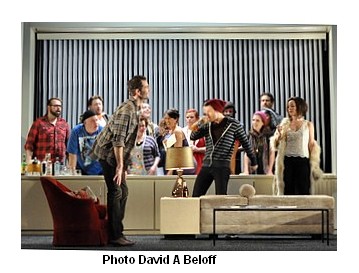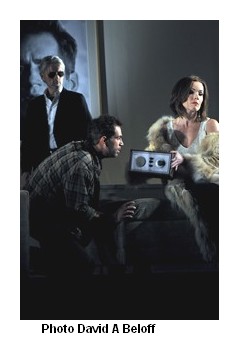
ReviewsOrphée Jean Cocteau’s 1950 cult film classic Orphée put a 20th-century spin on the Greek legend of the poet who goes into the underworld to search for his beloved wife, Eurydice. Perhaps influenced by the death of his own wife in 1991, composer Philip Glass chose to adapt the film’s dialog as the libretto for his 1993 chamber opera Orphée, which had its Virginia premier on January 28 at the Harrison Opera House in a stunning production. This was far different from creating a score to accompany a silent film. Adapting the film’s script as his libretto, Glass eschewed the usual high points of an opera score — the big arias, the star moments — in favor of an ongoing series of events and conversations, sometimes murky, sometimes clear, echoing the fragmentation of modern life with fragments of music repeated in infinite variations as changing and unchanging as the sea. Conductor Steven Jarvi plumbed the emotional and dramatic depths of the music with a precise and skillful baton, though sometimes allowing the music at its height to drown the singing.
Cégeste, a young poet, is giving a reading in the apartment of Orphée, an older poet jealous of the newcomer’s popularity. When the crowd leaves, there’s a horrible noise, and the dead Cégeste is carried back into the apartment by two ominously faceless, helmeted motorcyclists. (Some of the dialog makes no sense because in the film it took place in a café or the street. Someone says, “This isn’t the way to the hospital.” Another says, “Bring him inside”—but he is inside.) The aloof and enigmatic Princess has been part of the party, yet apart from it. She is simply clad — dark, perfectly fitting slacks, a white, perfectly fitting shirt, and a stunning long beige coat that appears to be made from strips of rabbit skin woven together with the skin on the outside so that the fur can only be glimpsed. It bespeaks quintessential casual elegance that at once establishes its wearer as someone to be reckoned with.
That’s the first act — complicated, obscure, introducing the characters and exploring their complex relationships. They walk through mirrors into the underworld, which looks exactly the same — so which is reality? The apartment? Or the underworld? The first-time viewer can get a little lost, concentrating (as intently as Orphée does on his gnomic radio) on the repeating fragments and variations of the unfamiliar music. There are no great arias. The libretto is the Cocteau film script, so the music is sung conversation, and the action moves inexorably along, forcing the audience to wrench itself along, too. In the second act, the intensity deepens. Before a peculiar panel of three very odd underworld judges, the Princess admits to being in love with Orphée. And Orphée declares his love for the Princess — poets are often portrayed as being in love with death, but it’s rare that Death is portrayed as being in love with a mere mortal. From opposite ends of the stage, Orphée and the Princess sing of their love in an unconventional but absolutely ravishing duet. Yet Orphée is in the underworld to reclaim Eurydice, whom he has ignored in reality and the judges deem that she may return to life on condition that Orphée never look at her. It’s an impossible situation in the confines of their apartment, even though Heurtebise (who’s in love with Eurydice) does what he can to help her through it. “Hide, he’s coming!” Eventually, she fails; Orphée sees her; and she must return to the underworld forever. Orphée is devastated, having taken her for granted and now losing her forever. He gets into a brawl, is shot, and now he and the Princess/Death will be together forever. . . But no. Singing, “A poet requires sacrifice to make him immortal,” Death — the Princess— sacrifices herself for Orphée’s immortality. The poet returns through the mirror to Eurydice. They chat calmly about the baby to come. Was it a dream? Was it?
The single set and its subtle, effective lighting work very well; the various modern couches and beds are very firm, which allows the performers to sit and rise without visible effort — a small detail that indicates careful thought. The costumes work well also — every woman in the audience coveted the Princess’s coat — and the body doubles in the underworld appeared as believable duplicates of the main characters. Full disclosure: I was not expecting to like Orphée. The plot seemed overly cumbersome, and a whole evening of Philip Glass music might have been overkill. But I was absolutely blown away. In this dance of death and redemption, Virginia Opera has moved to a new level of excellence. Printer Friendly Format
|
 The plot is concentrated but murky, partly because everything takes place on the same beautifully lighted set. This creates a feeling of concentration, as well as a huge challenge for the designer, Andrew Lieberman, and the director, Sam Helfrich, in choreographing the large cast (and their body doubles) so that their passages to and from the underworld make sense. The solution: mirrors — “through the Looking Glass,” as it were, without the innocence.
The plot is concentrated but murky, partly because everything takes place on the same beautifully lighted set. This creates a feeling of concentration, as well as a huge challenge for the designer, Andrew Lieberman, and the director, Sam Helfrich, in choreographing the large cast (and their body doubles) so that their passages to and from the underworld make sense. The solution: mirrors — “through the Looking Glass,” as it were, without the innocence. Her enigmatic chauffeur, Heurtebise, gives the shocked Orphée a strange radio that emits incomprehensible messages. Orphée becomes obsessed with trying to make sense of the messages, completely ignoring his wife, Eurydice, who is trying to tell him she’s pregnant — but all he can hear is the radio. Heurtebise tries to comfort Eurydice, but it’s no use. She runs out of the apartment, is run over by the ominous motorcyclists and dies. The music rises in intensity, and Heurtebise reveals to Orphée the identity of the Princess, and that the poet can try to reclaim his wife from Death.
Her enigmatic chauffeur, Heurtebise, gives the shocked Orphée a strange radio that emits incomprehensible messages. Orphée becomes obsessed with trying to make sense of the messages, completely ignoring his wife, Eurydice, who is trying to tell him she’s pregnant — but all he can hear is the radio. Heurtebise tries to comfort Eurydice, but it’s no use. She runs out of the apartment, is run over by the ominous motorcyclists and dies. The music rises in intensity, and Heurtebise reveals to Orphée the identity of the Princess, and that the poet can try to reclaim his wife from Death. The dizzying complexity of the plot is perfectly limned by Philip Glass’s challenging music; both the score and the action reward concentration.
Heather Buck is extraordinary as the elegant, passionate Princess, whose riveting declaration of love comes so abruptly in the midst of what appears to be chaos. The rich baritone of Matthew Worth makes Orphée believable — his jealousy of the younger poet, his obsession with the radio, his captivation by the Princess — it’s a powerful performance. The sunny Eurydice, caught up in chaos, is the excellent Sara Jakubiak; Jeffrey Lenz brings depth and nuance to the role of the mysterious Heurtebise.
The dizzying complexity of the plot is perfectly limned by Philip Glass’s challenging music; both the score and the action reward concentration.
Heather Buck is extraordinary as the elegant, passionate Princess, whose riveting declaration of love comes so abruptly in the midst of what appears to be chaos. The rich baritone of Matthew Worth makes Orphée believable — his jealousy of the younger poet, his obsession with the radio, his captivation by the Princess — it’s a powerful performance. The sunny Eurydice, caught up in chaos, is the excellent Sara Jakubiak; Jeffrey Lenz brings depth and nuance to the role of the mysterious Heurtebise.